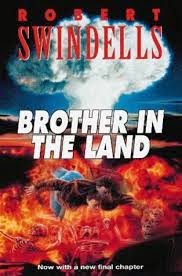Brother in The Land begins with teenager
Danny taking a break from working in his father’s corner store to go on a long bike
ride into the English countryside. It starts to rain, so he takes shelter in a
World War II pillbox. As he waits for the rain to stop, he sees the flashes of
nuclear missiles exploding.
Aware
that the rain might contain radiation, he waits for it to stop and then rides
back to his fictional hometown of Skipley. It is badly damaged and hundreds are
dead. The rest of the novel tells the story of Danny’s attempts to survive.
Brother in the Land is a young adult
novel told exclusively from Danny’s point of view. Danny seems slightly
emotionally detached from what is going on around him. He mourns little for
family and friends who died, which leaves the reader wondering if he had had
any friends. But perhaps he is just in shock and too busy getting on with
surviving to mourn.
The
novel does a realistic job of describing the aftermath of a nuclear attack: the
breakdown in authority, the wait for help while many people do whatever it
takes to survive, people dying of radiation sickness, crops failing, deformed
babies being born.
The
novel was written and set in the 1980’s, at a time when nuclear war was a big fear.
But the novel reads like it could have been written in the 50’s. One of the
reasons for this is the near total absence of females in leadership roles. There
is only one substantial female character in the novel, the tough, but pretty
Kim. She is used to show that Danny still has teenage hormones.
The
novel has a real boy’s own adventure feel to it. It is obvious that its author
Robert Swindells had a military background, with Danny’s devotion to duty being
one of the novel’s big themes. Duties that include helping his family and
joining a militia to fight those who sought to enslave the survivors.
The
prose is straightforward, with little creative flair. The sentences are short
and there is a lot of foreshadowing. Brother
in the Land won the “Other” award, but I could find no reference to that
award on the web.
Originally
the novel ended with little hope for Danny’s survival, but Swindells added a
new chapter that gives some hope. This seems unnecessary and goes against the novel’s
overall bleakness. It also seems unrealistic.
Except
for the additional chapter, Brother in
the Land appears to be a relatively realistic portrayal of a teenager
trying to survive after a nuclear war. As it progresses, it becomes a passable
action novel, with Danny forced to fight to survive. But his lack of emotion
left me thinking the author was too scared to explore the inner thoughts of his
main character. It is very much a novel for teenage boys who don’t want to read
any girly emotions.


No comments:
Post a Comment